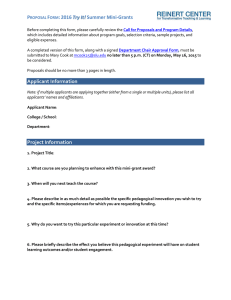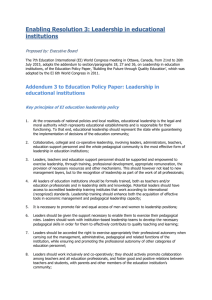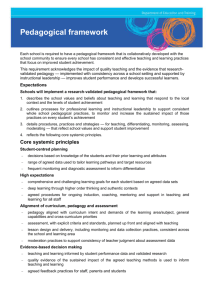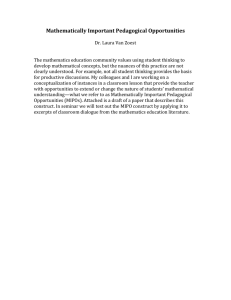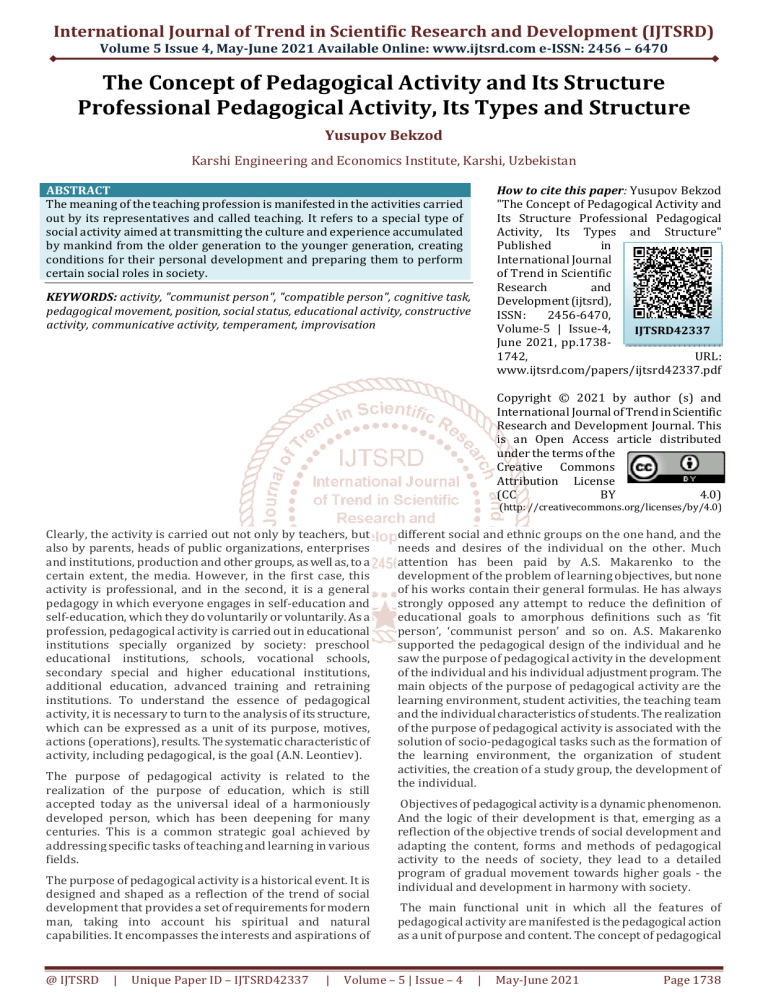
International Journal of Trend in Scientific Research and Development (IJTSRD)
Volume 5 Issue 4, May-June 2021 Available Online: www.ijtsrd.com e-ISSN: 2456 – 6470
The Concept of Pedagogical Activity and Its Structure
Professional Pedagogical Activity, Its Types and Structure
Yusupov Bekzod
Karshi Engineering and Economics Institute, Karshi, Uzbekistan
How to cite this paper: Yusupov Bekzod
"The Concept of Pedagogical Activity and
Its Structure Professional Pedagogical
Activity, Its Types and Structure"
Published
in
International Journal
of Trend in Scientific
Research
and
Development (ijtsrd),
ISSN:
2456-6470,
Volume-5 | Issue-4,
IJTSRD42337
June 2021, pp.17381742,
URL:
www.ijtsrd.com/papers/ijtsrd42337.pdf
ABSTRACT
The meaning of the teaching profession is manifested in the activities carried
out by its representatives and called teaching. It refers to a special type of
social activity aimed at transmitting the culture and experience accumulated
by mankind from the older generation to the younger generation, creating
conditions for their personal development and preparing them to perform
certain social roles in society.
KEYWORDS: activity, "communist person", "compatible person", cognitive task,
pedagogical movement, position, social status, educational activity, constructive
activity, communicative activity, temperament, improvisation
Copyright © 2021 by author (s) and
International Journal of Trend in Scientific
Research and Development Journal. This
is an Open Access article distributed
under the terms of the
Creative Commons
Attribution License
(CC
BY
4.0)
(http: //creativecommons.org/licenses/by/4.0)
Clearly, the activity is carried out not only by teachers, but
also by parents, heads of public organizations, enterprises
and institutions, production and other groups, as well as, to a
certain extent, the media. However, in the first case, this
activity is professional, and in the second, it is a general
pedagogy in which everyone engages in self-education and
self-education, which they do voluntarily or voluntarily. As a
profession, pedagogical activity is carried out in educational
institutions specially organized by society: preschool
educational institutions, schools, vocational schools,
secondary special and higher educational institutions,
additional education, advanced training and retraining
institutions. To understand the essence of pedagogical
activity, it is necessary to turn to the analysis of its structure,
which can be expressed as a unit of its purpose, motives,
actions (operations), results. The systematic characteristic of
activity, including pedagogical, is the goal (A.N. Leontiev).
The purpose of pedagogical activity is related to the
realization of the purpose of education, which is still
accepted today as the universal ideal of a harmoniously
developed person, which has been deepening for many
centuries. This is a common strategic goal achieved by
addressing specific tasks of teaching and learning in various
fields.
The purpose of pedagogical activity is a historical event. It is
designed and shaped as a reflection of the trend of social
development that provides a set of requirements for modern
man, taking into account his spiritual and natural
capabilities. It encompasses the interests and aspirations of
@ IJTSRD
|
Unique Paper ID – IJTSRD42337
|
different social and ethnic groups on the one hand, and the
needs and desires of the individual on the other. Much
attention has been paid by A.S. Makarenko to the
development of the problem of learning objectives, but none
of his works contain their general formulas. He has always
strongly opposed any attempt to reduce the definition of
educational goals to amorphous definitions such as ‘fit
person’, ‘communist person’ and so on. A.S. Makarenko
supported the pedagogical design of the individual and he
saw the purpose of pedagogical activity in the development
of the individual and his individual adjustment program. The
main objects of the purpose of pedagogical activity are the
learning environment, student activities, the teaching team
and the individual characteristics of students. The realization
of the purpose of pedagogical activity is associated with the
solution of socio-pedagogical tasks such as the formation of
the learning environment, the organization of student
activities, the creation of a study group, the development of
the individual.
Objectives of pedagogical activity is a dynamic phenomenon.
And the logic of their development is that, emerging as a
reflection of the objective trends of social development and
adapting the content, forms and methods of pedagogical
activity to the needs of society, they lead to a detailed
program of gradual movement towards higher goals - the
individual and development in harmony with society.
The main functional unit in which all the features of
pedagogical activity are manifested is the pedagogical action
as a unit of purpose and content. The concept of pedagogical
Volume – 5 | Issue – 4
|
May-June 2021
Page 1738
International Journal of Trend in Scientific Research and Development (IJTSRD) @ www.ijtsrd.com eISSN: 2456-6470
actions refers to the generality inherent in all forms of
pedagogical activity (lessons, excursions, individual
conversations, etc.), but is not reduced to any of them. At the
same time, pedagogical actions are specific, expressing the
universal and all the riches of this individual.
in the current situation, if he or she explains his or her
decision intuitively. Many factors influence a teacher’s career
choice. However, what is decisive among them is his
professional attitude, personality, temperament and
individual and typological characteristics of the character.
Referring to the forms of materialization of the pedagogical
movement helps to show the logic of pedagogical activity.
The pedagogical behavior of the teacher is manifested
primarily in the form of a cognitive task. Based on the
available knowledge, he theoretically compares the means,
subject matter, and expected outcome of his actions. The
cognitive task is solved psychologically and then takes the
form of practical transformational action. However, there are
some inconsistencies between the means and objects of
pedagogical influence that affect the outcome of a teacher’s
actions. In this regard, from the form of a practical act, the
action again takes the form of a cognitive task, the conditions
of which become more complete. Thus, the activity of the
teacher-educator, by its nature, consists of solving countless
tasks of different types, classes and levels.
L.B. Itelson described pedagogical positions in a typical role.
The teacher can act as follows:
The peculiarity of pedagogical problems is that their
solutions almost never appear. They often require diligent
work, analysis of many factors, conditions, and
circumstances. It is also not given in any definite formulas: it
is developed on the basis of prognosis. Algorithms for
solving interconnected pedagogical tasks are very difficult. If
an algorithm is available, applying it by different teachers
can lead to different results. This is because the creativity of
teachers is related to the search for new solutions to
pedagogical problems.
One of the most important requirements of the teaching
profession is the clarity of the social and professional
positions of these representatives. In it, the teacher
expresses himself as a subject of pedagogical activity.
The position of the teacher is a system of intellectual,
voluntary and emotional-evaluative relations to the world,
pedagogical reality and pedagogical activity. in particular,
which was the source of his activities. This is determined, on
the one hand, by the demands, expectations and
opportunities offered by society. On the other hand, there
are sources of internal, personal activity - the teacher’s
drivers, experiences, goals and objectives, his values,
worldview, ideals.
The position of a teacher reflects his personality, the nature
of social orientation, the type of civic movement and activity.
The social position of the teacher grows from the system of
views, beliefs and values formed in the general school. In the
process of teaching on their basis the motivational-value
attitude to pedagogical profession, the purposes and means
of pedagogical activity is formed. Motivational-value attitude
to pedagogical activity in a broad sense is manifested in the
direction that ultimately forms the personality of the
teacher.
The social status of a teacher largely determines his
professional position. However, there is no direct
connection, as upbringing is always based on personal
interactions. Therefore, the teacher, having a clear
understanding of what he is doing, is far from always giving
a detailed answer as to why he is doing so, otherwise, on the
contrary, it is usually contrary to reason and logic. No
analysis can help a teacher determine which sources of
activity are predominant when choosing this or that position
@ IJTSRD
|
Unique Paper ID – IJTSRD42337
|
if the information is limited by requirements, norms, views,
etc., the informant (e.g., you must be honest);
my friend, if he wanted to enter the soul of a child, "a
dictator, if he forcibly introduced norms and directions of
value into the minds of adult children;
consultant when using selective coaxation "
the applicant sometimes falls into a state of self-humiliation,
flattery, if the teacher asks the student to be “necessary”;
inspiring, if it seeks to capture (ignite) with interesting goals,
perspectives. Each of these positions can have both positive
and negative effects depending on the teacher’s personality.
However, injustice and arbitrariness always have negative
consequences; playing with a child, turning him into a little
idol and a dictator; bribery, disrespect for the child’s
identity, suppression of his initiative, and so on.
The set of professionally defined requirements for a teacher
is determined as follows: professional training for
pedagogical activity. In its composition, on the one hand, the
separation of psychological, psychophysiological and
physical training is legitimate, and on the other hand,
scientific, theoretical and practical training as the basis of
professionalism.
The content of professional training is a reflection of the
immutable, idealized parameters of the teacher's personality
and professional activity, which are collected as a reflection
of the purpose of teacher education.
To date, a great deal of experience has been gained in
creating a teacher’s profesiogram program, which allows a
teacher to combine professional requirements into three
main complexes that are interrelated and complementary:
general civic qualities; qualities that determine the specifics
of the teaching profession; special knowledge, skills on the
subject (specialty). Psychologists resort to compiling a list of
pedagogical skills that are a synthesis of the qualities of
mind, emotion, and will of the individual in substantiating a
professiogram. In particular, V.A. Krutetsky identifies
didactic, academic, communicative skills, as well as the
ability to disseminate pedagogical imagination and attention.
A. I. Shcherbakov is one of the important pedagogical skills, it
is didactic, constructive, perceptive, expressive,
communicative and organizational. He also believes that in
the psychological structure of the teacher's personality
should be distinguished general civic qualities, moralpsychological, socio-emotional, individual psychological
characteristics, practical skills and abilities: general
pedagogical (information, mobilization, development, or
general problems (constructive, organizational, research),
communicative (communication with people of different
ages), self-education (systematization and generalization of
knowledge and application in solving them) data).
Learning activity is a special type of social (professional)
activity aimed at achieving educational goals.
Volume – 5 | Issue – 4
|
May-June 2021
Page 1739
International Journal of Trend in Scientific Research and Development (IJTSRD) @ www.ijtsrd.com eISSN: 2456-6470
Traditionally, the main types of pedagogical activity carried
out in a holistic pedagogical process are education and
upbringing. Training within any organizational form usually
has strict time limits, a clearly defined goal, and ways to
achieve it. The most important criterion for the effectiveness
of education is the achievement of educational goals.
Educational work carried out within the framework of any
organizational form does not seek to achieve the goal
directly, because it is not carried out within a limited period
of time in the organizational form. In educational work, it is
possible to envisage only the consistent solution of goaloriented tasks. The most important criterion for the effective
solution of educational problems is the positive changes in
the minds of students, which are manifested in emotional
reactions, behaviors and activities. It is also difficult to
distinguish the outcome of a teacher’s activity in a
developing individual.
The identification of the peculiarities of the main types of
pedagogical activity shows that in their dialectical unity
education and upbringing take place in the activity of a
teacher of any specialty. The goals of teaching and learning
are an external component of the education system: they are
set by society, which determines the effectiveness of this
system.
The structure of pedagogical activity for the modern teacher
for the effective performance of pedagogical functions, the
interdependence of its main components, pedagogical
actions, important professional skills and the psychological
qualities necessary for its implementation (PVU and K ) is
important. In contrast to psychology’s understanding of
activity as a multi-level system, its components are goals,
motives, actions, and outcomes, and the approach to
selecting its components as relatively independent
functional activities over the teacher takes precedence over
pedagogical activity. Let’s look at both approaches.
1.
The structure of pedagogical activity is characterized by
the following components (with the corresponding
abilities that are reflected in the skills):
constructive activity - constructive and meaningful
(selection and composition of educational material,
planning and construction of pedagogical process),
constructive and operational (planning of students
themselves and actions) and constructive-material
(designing educational and material base of pedagogical
process) ;
Organizational activity - the implementation of a system
of actions aimed at the active involvement of students in
various activities, the organization of joint events, the
independent organization of the teacher's personal
activities at the university;
communicative activity - the establishment of
pedagogically appropriate relationships of the teacher
with students, other teachers, parents and members of
the public;
Gnostic component - a system of knowledge and skills of
the teacher, as well as certain features of cognitive
activity that affect its effectiveness;
control and evaluation (reflective) component.
The essence and structure of pedagogical activity, as well as
the effectiveness associated with them, is one of the most
pressing issues of pedagogical science and practice.
@ IJTSRD
|
Unique Paper ID – IJTSRD42337
|
Typically, the scientific analysis of these important events is
replaced by general discussions about the pedagogical art.
The work of a teacher is unique, it is a high art like the skill
of a composer and an artist, and it is even more complex.
Of course, the scientific analysis of pedagogical activity
emphasizes the uniqueness of each teacher's creative style,
but it is based not on descriptions, but on the principles of
comparative research, qualitative and quantitative analysis.
The direction associated with the application of the
principles of analysis and a systematic approach to
construction is particularly promising.
The professional activity of a teacher has its own
characteristics and mainly consists of the following.
1.
In the sum of the known physical, intellectual strengths
and abilities of the teacher, as a result of which he
successfully carries out the appropriate activities for
education and upbringing. The most important among
them is organizational skills.
2.
In the specificity of the object of pedagogical work,
which simultaneously becomes the subject of this
activity. The activity of students as a subject of
pedagogical work is largely determined by the level of
their organizational knowledge and skills.
3.
The peculiarity of the teacher's means of labor is that
the main part of them is spiritual.
4.
In the specific features of the relationship between the
three subsystems (the sum of the intellectual and
physical strength of the teacher, the specific data of the
object of work and the generality of the means and
structure of the activity).
The professional pedagogical activity of a teacher can be
considered as an integral dynamic system. N.V. Kuzmina
identifies the components and functional components of
pedagogical activity.
Simonov identifies the following methods of teacher activity,
taking into account the peculiarities of the organization of
the learning process.
1. Types of activities that describe the preparation for the
lesson. There are two ways to prepare teachers for a lesson.
Some of them develop a detailed lesson plan and try to
implement it, thinking in detail how to solve lesson
problems. They do this not because they consciously follow
instructions, but because they want to avoid unexpected
situations in the classroom. These are usually teachers with
a weak and inert nervous system. Other teachers are less
careful and conservative, do not spend much time preparing
for the lesson, do not think in detail about how to solve
lesson problems, do not like to make detailed abstract plans.
They improvise, teaching the lesson live in a “mood”. They
are not afraid of surprises that occur in the classroom, they
do not disappear, they quickly change the lesson plan and
change this or that way of solving problems. These are
teachers with mobile and strong nervous systems. The
disadvantage of this method is the confusion of the lesson if
the teacher is not assembled.
2. Methods of motivating students to learn. They have both.
The first group mainly uses the explanatory logic of the
learning material as an incentive, skillfully sets cognitive
tasks, and creates problem situations. They use less
precision, games, and less interest. The second group of
Volume – 5 | Issue – 4
|
May-June 2021
Page 1740
International Journal of Trend in Scientific Research and Development (IJTSRD) @ www.ijtsrd.com eISSN: 2456-6470
teachers gives a firm command, their disciplinary effect is
the same. They control more students. Such teachers ensure
that the lesson is well organized due to the high discipline of
the students. The first group conducts the survey
immediately, corrects errors in answering, actively
participates in the answer, interrupts students. The second
group of teachers creates a calm environment of inquiry,
almost does not interfere with the student’s response, and
allows him or her to fully express his or her opinion. The
first group is teachers with a weak and mobile nervous
system, the second group is teachers with a strong and inert
nervous system.
3. Methods of teaching the material. There are three of them.
Some are trying to create a complete indicative base of
activities not only for themselves (in preparation for the
lesson) but also for students. Therefore, the introductory
part is devoted to the purpose of the lesson, a detailed
explanation of the exercises performed. The disadvantage of
this method is the delay in explanation. Other teachers spend
less time on initial explanations and give them to them
during practice. Disadvantages of this method - impulsive
behavior, impatience, sometimes haste.
Teachers are often confronted with a mixed method of
preparing for and conducting a lesson: it is characterized in
part by features that are manifested in the first and second
methods. This is because in such teachers it is possible to
combine a strong nervous system with the inertia of neural
processes and a weak nervous system with the mobility of
neural processes.
E. Grigorev emphasizes that for the successful work of a
teacher the individual qualities of a person are preferred: a
calm, even cheerful (even in difficult conditions) mood; selfconfidence, optimism (cheerfulness), energy; sense of
humor, resourcefulness; balance, endurance, self-control,
patience, ability to change emotions; sensitivity, empathy,
emotional connection, kindness, courtesy; emotional, motor,
visual memory; creative imagination; general cultural and
value-oriented knowledge; perseverance, independence,
perseverance in decision making.
The author considers the teaching profession undesirable:
isolation, low mood and activity; suspicious character;
emotional deafness and politeness; the desire to be special in
any situation, to attract attention; exemplary tone in
communication, arrogance; lack of assembly, distraction,
inconsistency, inconsistency in actions and movements;
unstable character type.
In modern psychology, individual methods of activity are
also distinguished, that is, the most effective system of
techniques and methods for the organization of the
individual's own work.
typological characteristics, or by deep self-knowledge or
side-by-side targeted actions (e.g., the efforts of an
experienced teacher). A conscious way of shaping a style of
activity is to adapt a person, to adapt his mental
characteristics and qualities to a particular professional
activity, to reduce the demand for higher-skilled actions. In
this sense, a particular authority can shape a style of action
based on a specific individual standard.
Thus, an individual work style, an individual communication
style is formed, i.e. a favorite system of methods and
techniques derived from work that characterizes the
characteristics of pedagogical activity.
There are four types of individual methods of pedagogical
activity in pedagogical psychology (Markova A., 1993.):
1. Emotional improvisation. The teacher follows it, pays
attention to the learning process, explains the new material
logically, usually addresses strong students, has quick
conversations with them, asks informal questions, but gives
little opportunity to talk, which complicates ideas.
2. Emotional and stylistic style. The main features of this
method are: focus on the process and learning outcomes,
adequate planning of the learning process, high efficiency,
superiority of intelligence over reflexivity.
3. Intellectual and improvisation. In his work, the teacher,
whose attributes are a priority, focuses on the process and
learning outcomes, adequately planning the learning
process. In his work, he is not very good at choosing and
changing teaching methods, is not able to ensure high speeds
of work, and rarely leads to collective discussions. This has
an indirect effect on students during the survey.
4. Intellectual and methodological. Its features are mainly
focused on learning outcomes, adequate planning of the
learning process, conservatism in the use of tools and
methods of pedagogical activity.
The individual style of pedagogical activity is very important
because it determines the success of the teacher.
At the same time, M. Sanaya emphasizes the dynamic
features of the style, the most important of which are:
1. Flexibility - conservatism (the ability to respond to
changing situations, switch from one type of activity to
another, change the lesson plan, inability to adapt to learning
activities or changing situations, carefully follow the plan);
2. Impulsiveness - caution (improvisation in class or careful
adherence to previously thought-out actions);
3. Stability - instability (not depending on the situation, but
on your goal or behavior depending on the situation in the
classroom);
As a result of the research activities of V. Merlin and his
students, the main reasons for the manifestation of a
particular individual style of activity were identified. The
formation of an individual style of activity is, as a rule,
associated with the tendency of a person to perform
activities, which is the result of the typological features of
the manifestation of the characteristics (temperament) of
the nervous system within it. This method of shaping the
mode of operation is called spontaneous.
4. Emotional attitude towards students (good intentions,
sudden loss of patience or balance in the relationship,
situational assessment of knowledge, student activity,
personality traits);
There is also a conscious, focused way of shaping an
individual style of activity. It is also determined by taking
into account a person’s strengths and weaknesses, his or her
Thus, the teacher as a subject of pedagogical activity must
have a professional and pedagogical orientation, pedagogical
skills, developed general and pedagogical skills, professional
@ IJTSRD
|
Unique Paper ID – IJTSRD42337
|
5. Availability - the absence of personal discomfort
(emotional tension, anxiety, increased sensitivity to failures
and mistakes, calmness, appropriate response to failures and
mistakes);
Volume – 5 | Issue – 4
|
May-June 2021
Page 1741
International Journal of Trend in Scientific Research and Development (IJTSRD) @ www.ijtsrd.com eISSN: 2456-6470
and pedagogical skills; ensuring the interaction,
effectiveness of the effective subject in solving problems of
teaching, learning and development.
[5]
Azimova N. E., Eliboeva LS Some aspects of increasing
the level of ecological culture // Science, technology
and education. - 2019. - No. 1 (54).
References:
[1] Azimova N. E. et al. Youth Is Moving Force of Civil
Society // Eastern European Scientific Journal. - 2019.
- No. one.
[6]
Xoliqov A. Pedagogical skills (textbook). -T., 2011.
[7]
Azizxodjaeva N.N. Pedagogical technology and
pedagogical skills (textbook). –T., 2006.
[8]
Ibragimov H., Yuldashev U. and others Pedagogical
psychology (textbook). -T., 2007.
[9]
Ochilov Malla. The teacher is the architect of the
heart. - T., 2000.
[10]
Pirmuhammedova M. Fundamentals of pedagogical
skills.-T.: 2001.
[11]
Karimova V. Methodical manual "Independent
thinking". -T.: - 2000 y
[2]
[3]
[4]
Azimova N. E. Technology of spiritual and moral
education of a teacher of vocational education in the
learning process // Young scientist. - 2011. - No. 5-2. S. 117-118.
Azimova N. E. The role of a professional teacher in the
preparation of a harmoniously developed personality
// International journal of humanitarian and natural
sciences. - 2018. - No. 5-1.
Azimova N. E., Nasimova Z. IK IMPORTANT
FEATURES OF HUMAN EDUCATION IN THE FAMILY
// Academy. - 2020. - No. 5 (56).
@ IJTSRD
|
Unique Paper ID – IJTSRD42337
|
Volume – 5 | Issue – 4
|
May-June 2021
Page 1742

